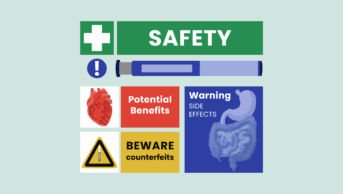
Shutterstock.com
Medication safety officers in England have reported five cases of patients being given incorrect dosing advice when switching insulin pre-filled pens, with one patient requiring hospital treatment for diabetic ketoacidosis.
A national patient safety alert, published on 8 December 2023, said some patients were switched to Tresiba FlexTouch 200 units/mL pre-filled pens (insulin degludec; Novo Nordisk), following a medicine supply notification issued in May 2023, because of a shortage of Tresiba 100 units/mL pre-filled pens.
According to the alert, several patients had been incorrectly advised to administer half the number of units despite the manufacturer’s instruction that no dose conversion is required when switching strengths as the dials are expressed in units rather than volume.
It added that medication safety officers suggested these errors occurred at the prescribing, dispensing and administration stages of the medication journey.
The patient safety alert advised primary care providers that all patients initiated on a new device require counselling on the change; training on use, including signposts to training videos; and potential need for closer monitoring of their blood glucose levels.
Commenting on the switching errors, Philip Newland-Jones, consultant pharmacist and clinical director of the endocrine diabetes service at Southampton General Hospital, said: “The dose of insulin is the same whether using U100 or U200 insulin — a unit of one is the same as a unit of the other, the only difference is the volume that is being administered.
“Pharmacists noting that a patient’s device or insulin concentration has changed on prescription are well placed to question if this was intentional, and ensure they are able to sense-check the advice given regarding any dose changes,” he added.
“There may be occasion, if switching between different types or brands of insulin, where a dose is reduced by 10–20% as a precaution and titrated back up as required, but this does not need to be done when switching between different concentrations of the same brand.
“Switching insulin products is not unsafe, as long as the prescriber has good awareness of the practicalities of insulin administration and the differences between different brands of insulin and their concentrations.”
Commenting on the alert, Helen O’Neil, co-chair of the UK Clinical Pharmacy Association’s Diabetes and Endocrinology Committee, said: “It is important to ensure that all healthcare professional involved in the prescribing, administration and dispensing of insulins have adequate training on insulin safety to prevent such incidents.
“Although the national patient safety alert is cascaded widely, healthcare providers should ensure there are robust systems in place to highlight relevant learning from such events to healthcare staff working in patient-facing roles,” she added.
A learning article from The Pharmaceutical Journal on insulin in practice for people with type 2 diabetes mellitus includes advice on switching products.


